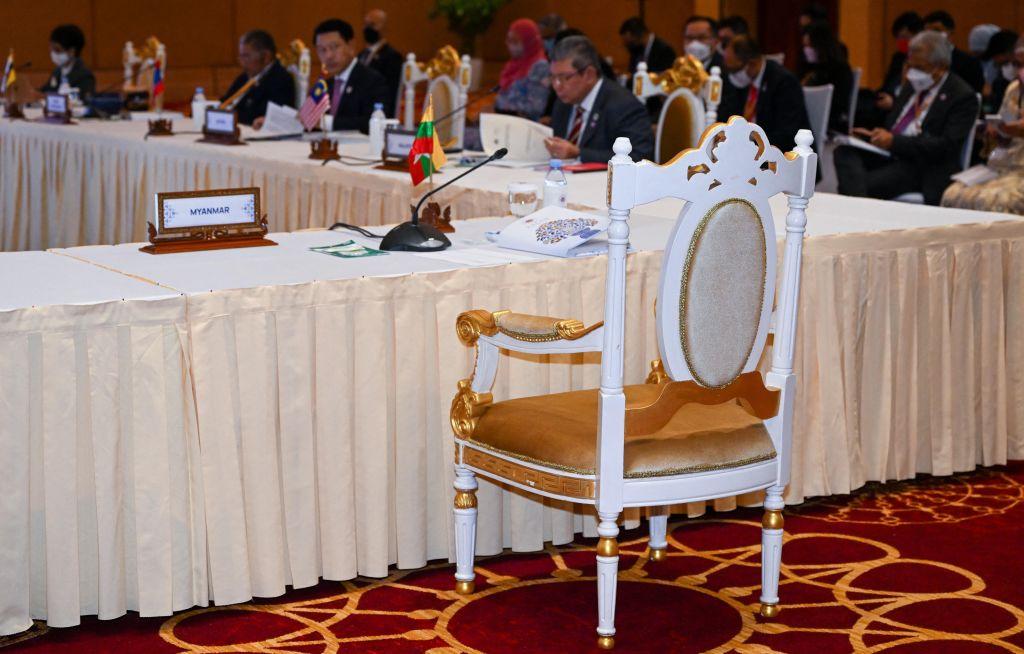
The recent executions of four high-profile democracy activists in Myanmar—the first to take place in the country in more than three decades—plainly demonstrate the enduring brutality of its military regime. Since ousting the civilian government in a coup d’état in February of last year, Myanmar’s military regime, known as the State Administrative Council (SAC), has murdered at least 2,220 civilians, forcibly displaced more than 900,000, and led the economy to the brink of collapse, forcing millions into poverty.
The sheer scale of violence and devastation brought about by the junta forced even the Association of Southeast Asian Nations, a regional organisation well known for its adherence to the principle of ‘non-interference’, to lay out a comprehensive roadmap towards a resolution of the ongoing crisis. This ASEAN-backed plan, known as the ‘five-point consensus’, laid out a set of actions agreed among all parties to reduce hostilities. Most critically, it called for an ‘immediate cessation’ to the violence across the country and for ‘constructive dialogue among all parties concerned’.
More than a year later, however, the junta and its leader, Min Aung Hlaing, have shown little willingness to implement any of the agreement’s provisions. Instead, the regime has ramped up its crackdown on dissent and repeatedly violated the agreement’s terms by refusing to engage with the political opposition. Recent events that continue to demonstrate the junta’s unwillingness to abide by the terms of the agreement have amplified the document’s myriad shortcomings, and made it increasingly difficult for ASEAN members to ignore that it has become an abject failure.
Speaking at the ASEAN foreign ministers’ meeting in Phnom Penh in August, Prime Minister Hun Sen of Cambodia—this year’s rotating chair of ASEAN—said that if more political prisoners were to be executed by the SAC, ASEAN would be ‘forced’ to rethink its role in relation to the agreement. Similarly, Malaysia’s foreign minister, Saifuddin Abdullah, an outspoken critic of the troubled peace process, repeatedly stressed the need for ASEAN to ‘morally support’ and engage with Myanmar’s parallel National Unity Government (NUG). In a Facebook post written in response to the executions, Saifuddin stated in not-so-subtle terms that the junta was ‘making a mockery’ of the agreement.
While it remains unlikely that ASEAN will attempt to completely overhaul the agreement due to the SAC’s non-compliance, the ministers’ joint communiqué indicates that the structure and framework of the deal could soon be reconfigured.
Capitalising on ASEAN’s frustration with the junta’s truculence, the NUG recently opened offices in several Western countries to apply new diplomatic pressure. In Australia, the NUG held an opening ceremony for its first representative office in Canberra in early August. The Australian Greens announced at the ceremony that the party would begin to recognise the NUG as the official government of Myanmar, and encouraged other political parties to do the same.
The opening of the NUG office marks a watershed moment for Australia and presents an opportunity for the government to strengthen its approach. Although Australia has effectively downgraded its relations with Myanmar since the coup, it still hasn’t imposed any sanctions on military leaders, and has simultaneously taken steps that confuse its overall stance on the crisis.
Andrea Faulkner, the former Australian ambassador to Myanmar, for instance, met with Min Aung Hlaing in April. According to the Department of Foreign Affairs and Trade, Faulkner used her meeting to urge the junta to ‘cease violence, release arbitrary detainees, engage in dialogue and ensure unimpeded access for humanitarian assistance’. One of the detainees whose release she specifically called for is an Australian citizen, Sean Turnell. Although DFAT considers Faulkner’s visit to have been undertaken in good faith, activists in Myanmar viewed it as conferring unnecessary legitimacy on the SAC. And it was one of at least eight meetings or phone calls Australian officials have had with representatives of the junta since the coup. Whatever the purpose, they demonstrate Australia’s willingness to engage directly with the SAC.
While Australia’s position towards Myanmar is evolving under the Labor government of Prime Minister Anthony Albanese, the country’s approach is becoming increasingly untenable—especially as Indonesian Foreign Minister Retno Marsudi prepares to take the reins as ASEAN’s special envoy to Myanmar in Indonesia’s capacity as next year’s ASEAN chair.
One of the most vocal critics of the five-point consensus and the Myanmar regime, Marsudi led the charge at last year’s ASEAN summit to exclude the SAC at the political level from all ASEAN meetings, saying that the country shouldn’t be represented until it had restored democracy ‘through an inclusive process’. At the foreign ministers’ meeting last month, Marsudi said that Indonesia had not seen any commitment or ‘goodwill’ from the SAC to implement the agreement. A substantial reconfiguration under her leadership may soon become a reality.
With a shift in ASEAN’s approach towards Myanmar likely on the horizon, Australia should take the opportunity to expand its engagement with the NUG and work with ASEAN to reinvigorate a stronger regional response to the crisis. The Albanese government has identified deeper engagement with ASEAN as a priority of its foreign policy, and it should capitalise on Australia’s comprehensive strategic partnership with ASEAN to address the most pressing issue facing the region.
Engaging with the NUG in an informal, but public, capacity will allow Australian officials to develop a better understanding of the crisis, and provide an opportunity to listen to the needs of Myanmar’s people, such as for humanitarian assistance, access to education, and assistance in good governance that will help the NUG to build capacity and make it more effective at organising itself and delivering for the Myanmar people.
While this engagement should ultimately extend beyond the NUG representative office in Canberra, the office can act as a conduit for formal talks between Australian officials and NUG representatives in Myanmar.
With a more aggressive ASEAN chair taking the helm next year, it should behove Australia to work more closely with Indonesia and other ASEAN partners to forge a consistent dialogue between ASEAN and the NUG.